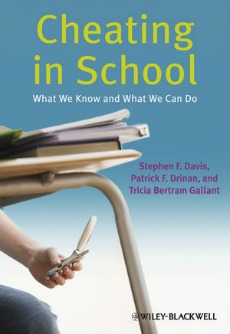In CHEATING IN SCHOOL: What We Know and What We Can Do, (Wiley-Blackwell) authors Stephen F. Davis, Patrick F. Drinan, and Tricia Bertram Gallant provide a comprehensive look at the cheating phenomenon from primary through graduate school. In an email interview with Faculty Focus, the authors discuss academic integrity issues in higher education specifically, including steps that can be taken at the institutional level as well as in individual classrooms.
Faculty Focus: What are some of the most common forms of cheating that occur in college?
Authors: Around half of the students surveyed admit to homework copying, plagiarism (copying and pasting another’s words or ideas without attribution), and exam cheating (whether copying or use of unauthorized aid) are the most common.
We still catch students who use old fashioned methods for exam cheating (like writing the answers on an arm for easy access during the test), but we suspect that many students are using digital aids that are likely more difficult to catch. Some of the more egregious acts that are thankfully less common (we think) include: submitting a paper written by someone else (paper mills are a booming business), arranging for an exam-proxy, stealing exams out of professors’ offices to distribute ahead of time, fabricating lab data, and altering incorrect answers on a graded exam and asking for a re-grade.
Faculty Focus: At the classroom level, what are some specific steps that college instructors can take to reduce cheating in their courses?
Authors: We cover this extensively in the book, but briefly, here are a few strategies instructors can implement to discourage cheating:
- Clearly articulate your expectations for the class and EACH INDIVIDUAL ASSIGNMENT. Can students work with others on their homework assignments, for example? Can they use old exams, lab reports, etc. as aids in the course?
- Explicitly link assignments to learning objectives. Students often cheat on assignments that they see as meaningless or “busy-work.” If they understand the point of the assignment, especially how it will help them learn the material, they are more likely to push through it on their own rather than copy from someone else.
- Reduce temptations to cheating. We cannot control student behavior, but we can at least show them that we care about the integrity of our classes by doing little things. For example, space students out during exams, provide multiple versions of the same test, require students to leave all non-essential materials at the front of the room, and have the WiFi turned off in the test room.
- Talk to students about the relation of academic integrity to professional ethics and their future chosen career. Students are more likely to uphold integrity in academic assignments if they see it as holding more value than just being “another institutional rule.”
- Report all cheating when you see it, rather than ignore it or handle it on your own. A professor can become known as someone who does not tolerate cheating or look the other way, and then the cheaters will not choose her class! Also, many professors mistakenly assume that they can reduce cheating on their own, but it takes the entire campus. If instructors do not report cheating, that same student may be cheating in other courses and no one would ever know!
(Editor’s note: In part two of this interview the authors will offer advice to academic leaders on creating healthy ethical environments that support ethical choices at all levels of the organization. Look for it in the Oct. 14 issue of Faculty Focus.)
Reference:
Davis, S., Drinan, P., & Gallant T. (2009). CHEATING IN SCHOOL: What We Know and What We Can Do. Wiley-Blackwell.
Author Bios:
Stephen F. Davis is Professor Emeritus at Emporia State University (Kansas), Distinguished Guest Professor at Morningside College (Iowa) and Visiting Distinguished Professor of Psychology at Texas Wesleyan University.
Patrick F. Drinan, Professor of Political Science at the University of San Diego, completed his Ph.D. in 1972 at the University of Virginia, and has served as the dean of the College of Arts and Sciences at the University of San Diego from 1989-2007.
Tricia Bertram Gallant is the Academic Integrity Coordinator at the University of California, San Diego, and is the current Chair for the Center for Academic Integrity’s Advisory Council.






